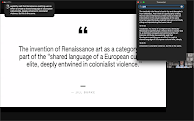Event #3: LASER: De-colonizing AI
A few days ago, I attend the "LASER: De-colonizing AI" in which I learned about different areas of study relating to AI, art, and history that I never have considered. Broadly, the event touched on how AI has introduced new cultural and conceptual frames and ways of thinking.
For example, interactive AI has helped minority women share recipes and cooking skills while shaping newly acquired English abilities. This stemmed from AI research students who took the time to design algorithms for teaching cooking. This example made me think more intensely about how AI is quickly integrating itself into our communities, and serving as a problem solver for it.
Another project was created for the purpose of serving disabled children. Unemployed artists, teachers, psychologists, designers, and health workers were recruited to create interactive AI systems to help these children communicate. AI has also been found to create problem-solving tools for people who are hard of hearing and vision, the New York Times quotes "With A.I., the speech-to-written-word translation is far more fluent than automatic speech recognition used to be" [Tugend]. AI has been studied to improve accessibility in other ways, such as accessibility in testing, content descriptions, and webpage interactions [Brewer, et al]
In my opinion, the highlight of this presentation was a segment by one of the speakers in which she touched on the inherent racism by AI, as exemplified in the picture above. The speaker gave a few examples of how AI leans to favor white faces, and after some outside research, others have reported the same thing. For instance, Twitter users once realized that the platforms' image cropping tool constantly concentrated on white faces. Furthermore, AI robots tend to identify women as "homemakers" and people of color as "criminals" amongst other stereotypical labels [Raikes].
Proof of Attendance:
Sources:
Brewer, Judy, et al. “3 Ways AI Can Help Students with Disabilities.” EDUCAUSE Review, 3 June 2022, https://er.educause.edu/articles/2022/6/3-ways-ai-can-help-students-with-disabilities. Accessed 9 June 2023.
Raikes, Jeff. “AI Can Be Racist: Let’s Make Sure It Works For Everyone.” Forbes, 21 Apr 2023, https://www.forbes.com/sites/jeffraikes/2023/04/21/ai-can-be-racist-lets-make-sure-it-works-for-everyone/?sh=6d868372e40d. Accessed 9 June 2023.
Tugend, Alina. “How Robots Can Assist Students With Disabilities.” The New York Times, 29 March 2022, https://www.nytimes.com/2022/03/29/technology/ai-robots-students-disabilities.html. Accessed 9 June 2023.






Comments
Post a Comment